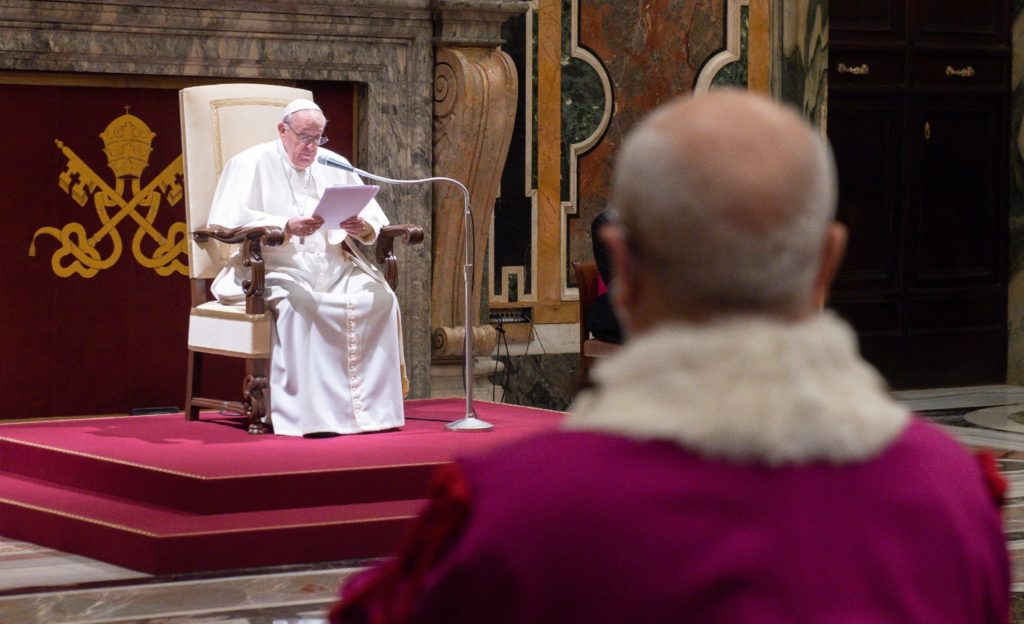 The Pope announces the "Amoris Laetitia Family Year".
The Pope announces the "Amoris Laetitia Family Year". Pope Francis expands women's service in the liturgy
Pope Francis expands women's service in the liturgyOn January 29, Pope Francis delivered the traditional Address to the Roman Rota on the occasion of the inauguration of the Judicial Year of this tribunal. On this occasion the Holy Father wanted to continue along the lines of his last addressreferring to the the need for faith to illuminate the conjugal union and how the lack of it can affect the marriage; as well as highlighting the fundamental aspects of the conjugal union, which are not limited to the spouses, but also to the children.
Nullity proceedings
Before continuing with this commentary, it would be useful to have a little context, since the Pope refers to the judicial work carried out by judges, auditors, lawyers and collaborators of that tribunalThe main function of the Tribunal is to hear the processes of declaration of marriage nullity of the whole Church, specifically as a court of appeal.
On the occasion of the two synods of bishops on the family, one extraordinary (October 2014) and the other ordinary (October 2015), Francis welcomed some of the suggestions of the synod fathers, among them "the need for make them more accessible and agileThe procedures for the recognition of nullity cases, possibly completely free of charge". Thus, on December 8, 2015, the motu proprio came into force "Mitis Iudex Dominus Iesus"The Synod on the processes for the declaration of marriage nullity for the Latin Church. Likewise, as a result of both synods, we have the Apostolic Exhortation "Amoris Letitia".
The good of the family
In this regard, the Pope encourages judges to take into account that the bonum familiae (family property) cannot be contained in a chapter or cause of nullity, but goes beyond, since the good of the family "is always and in any case the blessed fruit of the conjugal covenant.The family cannot be extinguished in toto by the declaration of nullity, because being a family cannot be considered a suspended good, since it is the fruit of the divine plan, at least for the offspring generated.".
Thus, the problem arises: what happens to the children of a marriage that has been declared null and void (i.e. never existed)? What to do when one of the spouses does not accept the judgment declaring the marriage null and void? Even before there is a judgment, we can find marital situations in which one spouse is abandoned by the other spouse who establishes a new sentimental relationship: "How can we explain to children that - for example - their mother, abandoned by the father and often unwilling to establish another marriage bond, receives the Sunday Eucharist with them, while the father, cohabiting or awaiting the declaration of nullity of the marriage, cannot participate in the Eucharistic table?".
Distinguishing the legal from the pastoral
Pope Francis raises real situations, hard and very difficult to solve. A distinction must be made between the legal and the pastoral part.The law does not require judges to disregard the consequences of a judgment declaring a marriage null and void. For this purpose, mention is made of Amoris Letitia241, which in n. 241 presents some criteria to be taken into account, highlighting the care of the weaker party, such as the abused or abandoned spouse or the young children; while in n. 242 it is advised that "a particular discernment is indispensable for pastoral accompaniment the separated, the divorced, the abandoned. We must especially welcome and appreciate the pain of those who have suffered unjust separation, divorce or abandonment, or who have been forced to break the cohabitation due to the abuse of their spouse.".
That is to say, the problem does not end with the sentence, but it will now be necessary to accompany those people who are most affected.. For this reason, Francis also addresses the bishops and their collaborators, urging them to follow the same line: "The bishops and their collaborators must be in the same line.It is more urgent than ever that the bishop's collaborators, in particular the judicial vicar, the agents of family pastoral care and especially the parish priests, make an effort to exercise this diaconia of protection, care and accompaniment of the abandoned spouse and possibly of the children who suffer the decisions, however just and legitimate, of marriage annulment.".
Free of charge and brevity
Finally, we wanted to to reinforce two ideas present in Pope Francis' reform of the processes for the declaration of marriage nullity: free trials and the shortest process before the bishop.
On the one hand, he points out that when a lawsuit meets all the requirements prescribed by the norm and must be heard by the shortest process, this must be done and not avoided because it would be to the economic detriment of the lawyers or the court; moreover, the bishop is and must act as judge of that process, which consists of an extraordinary process and for grounds that are evident and of rapid proof.
In the foreword of the m.p. "Mitis Iudex Dominus Iesus"Pope Francis makes clear his concern of that the faithful may know the real situation of their marriage through more agile and accessible processes.The principle of indissolubility of marriage, the right to appeal the nullity sentence, as well as the need for moral certainty of the judge to declare a marriage null and void.
However, it seems that this reform is not yet complete and the Holy Father sees the need to clarify some points and, above all, not to lose sight of the pastoral care with which everyone - bishops, priests, judges, collaborators, etc. - must act when we are before the sacrament of marriage and the family.











